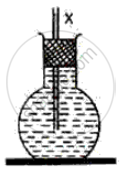Advertisements
Advertisements
प्रश्न
Explain with the help of formulae the expansion coefficients of liquid and gas.
उत्तर
The formula for the liquid expansion of gas is
V2 = V1 (1 + β Δ T)
or
β = `(("V"_2 - "V"_1)/"V"_1) 1/ (triangle "T")`
From the above formula, we can say that
- the volumetric expansion coefficient of a liquid (β) is defined as the fractional change in the volume of the liquid per degree Celsius (or Kelvin) change in temperature.
- the volumetric expansion coefficient of a liquid (β) is defined as the fractional change in the volume of the gas per degree Celcius (or kelvin) change in temperature at constant pressure. So, β is the constant pressure volumetric expansion coefficient in case of gas.
संबंधित प्रश्न
Explain the following:
Why does not a Pyrex tumbler crack when hot water is poured in it?
A round bottom flask containing coloured water, filtered with a stopper and a narrow glass tube is shown in the following diagram. What will happen to the water level X marked in the tube when it is placed in a hot water bath? Give a reason for your answer.

Give reasons for the following:
When boiling water is poured into a glass bottle, it generally cracks.
For a given heat in liquid, the apparent expansion is more than that of real expansion.
Explain the experiment of measuring the real and apparent expansion of a liquid with a neat diagram.
